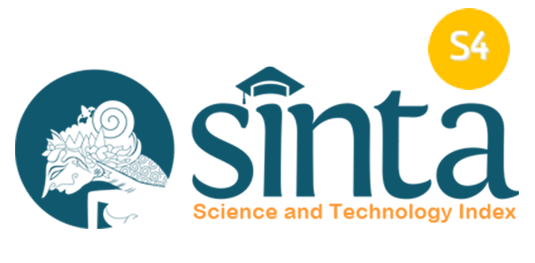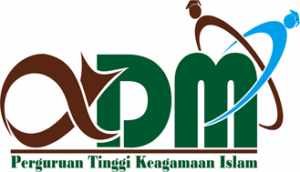Development of mathematical learning instruments based on ethnomathematics in character education learning
Abstract
The purpose of this research is to develope mathematical learning instrument based on ethnomatematics in strengthening students’ character education. The learning instruments consist of syllabus, lesson plan, and student worksheet. This research is a development study. This research was conducted in grade 8 of junior high school in Indonesia. This research was implemented in three stages, namely: define, design, and develop. The define phase includes the analysis of syllabus, syllabus, lesson plan, and student worksheet; the design stage includes the preparation of learning instruments draft and research instruments; the development stage includes the test of learning instruments, evaluation and perfection of learning instruments. The validation results of expert validators were as follows: syllabus device with a value of 4.62 with a very valid category, student worksheet instruments with a value of 4.59 with a very valid category, while the materials learning device with a value of 3.55 with a very valid category.
Keywords
Full Text:
PDFReferences
Adam, S. (2004). Ethnomathematical ideas in the curriculum. Mathematics Education Research Journal, 16(2), 49-68.
Agustin, R. D., & Patricia, F. A. (2018). Development of materials in materials module with appropriate resolution application. In University of Muhammadiyah Malang’s 1st International Conference of Mathematics Education (INCOMED 2017) (pp. 18-20). Atlantis Press.
Amit, M., & Qouder, F. A. (2017). Weaving culture and mathematics in the classroom: The case of Bedouin ethnomathematics. In Ethnomathematics and its Diverse Approaches for Mathematics Education (pp. 23-50). Springer, Cham.
Brandt, A., & Chernoff, E. J. (2015). The importance of ethnomathematics in the math class. Ohio Journal of School Mathematics, 1(71), 31–36.
Damazio, A. (2004). Especifidades conceituais da matemática da atividade extrativa do carvão [conceptual specifications of mathematical activities of coal extraction]. Coleção Introdução à Etnomatemática [Introduction to Ethnomathematics Collection] (Natal RN). Brazil: UFRN.
Danner, L. F., & Zambam, N. J. (2016). Modernization and development in Brazilian Amazon: giving voice to those who have no voice as basis of an alternative political, cultural, and economic project. Clareira-Revista de Filosofia da Região Amazônica, 2(2), 62-84.
D’Ambrosio, U. (2006). Ethnomathematics: Link between traditions and modernity. Rotterdam, Netherlands: Sense Publishers.
D’Ambrosio, U., & Rosa, M. (2017). Ethnomathematics and its pedagogical action in mathematics education. In Ethnomathematics and its diverse approaches for mathematics education (pp. 285-305). Springer, Cham.
Eglash, R. (1997). When math worlds collide: Intention and invention in ethnomathematics. Science, Technology, & Human Values, 22(1), 79–97.
Flora, P., & Alber, J. (2017). Modernization, democratization, and the development of welfare states in Western Europe. In Development of Welfare states in Europe and America (pp. 37-80). Routledge.
Fouze, A. Q., & Amit, M. (2018). Development of mathematical thinking through Integration of ethnomathematic folklore game in math instruction, 14(2), 617–630. https://doi.org/10.12973/ejmste/80626
Lipka, J., Andrew-Ihrke, D., & Yanez, E. E. (2011). Yup’ik cosmology to school mathematics: The power of symmetry and proportional measuring. Interchange, 42, 157–183.
Louie, N. L. (2017). The culture of exclusion in mathematics education and its persistence in equity-oriented teaching. Journal for Research in Mathematics Education, 48(5), 488-519.
Nuh, Z. M., & Dardiri. (2016). Etnomatematika dalam sistem pembilangan pada masyarakat melayu Riau. Kutubkhanah: Jurnal Penelitian Sosial Keagamaan, 19(2), 220–238.
Orey, D. C., & Rosa, M. (2006). Ethnomathematics: Cultural assertions and challenges towards pedagogical action. The journal of Mathematics and Culture, 1(1), 57-78.
Orey, D., & Rosa, M. (2007). Cultural assertions and challenges towards pedagogical action of an ethnomathematics program. For the Learning of Mathematics, 27(1), 10-16.
Richardo, R. (2016). Peran ethnomatematika dalam penerapan pembelajaran matematika, 7(2), 118–125.
Rosa, M., & Orey, D. C. (2016). State of the art in Ethnomathematics. In Current and future perspectives of ethnomathematics as a program (pp. 11-37). Springer, Cham.
Rosa, M., & Gavarrete, M. E. (2017). An Ethnomathematics overview: An introduction. In Ethnomathematics and its Diverse Approaches for Mathematics Education (pp. 3-19). Springer, Cham.
Russell, G. (2017). Indigenous students in relation to mathematics and ethnomathematics. In Transreform Radical Humanism (pp. 191-199). Sense Publishers, Rotterdam.
Sirate, S. F. S. (2015). Menggagas integrasi multikultur pembelajaran matematika: Suatu telaah etnomatematika. Jurnal Pendidikan Dasar Islam, 2(2), 246-263.
Utomo, A., & Mcdonald, P. (2014). Development, social change and assortative mating: Ethnic marriage pairing in Indonesia. Paper was presented at the Chaire Quetelet (pp.1–29). Louvain-la-Neuve, Belgium: Catholic University of Louvain.
Wahyuni, A., Tias, A. A. W., & Sani, B. (2013). Peran etnomatematika dalam membangun karakter bangsa. In Prosiding Seminar Nasional Matematika dan Pendidikan Matematika FMIPA Universitas Negeri Yogyakarta (pp.113–118).
Worthington, M., & van Oers, B. (2016). Pretend play and the cultural foundations of mathematics. European Early Childhood Education Research Journal, 24(1), 51-66.
DOI: https://doi.org/10.18860/ijtlm.v1i1.5353
Refbacks
- There are currently no refbacks.
Copyright (c) 2020 International Journal on Teaching and Learning Mathematics

This work is licensed under a Creative Commons Attribution-NonCommercial-ShareAlike 4.0 International License.
Indexed by :
.png)
.jpg)
.png)

.jpg)


